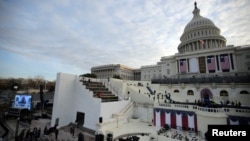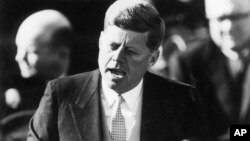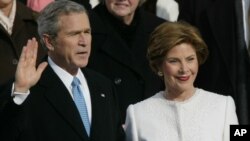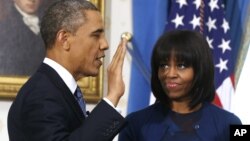Donald Trump steps into history when he takes the oath of office on the steps of the U.S. Capitol as the 45th president of the United States.
Historically, presidential inaugurations have often signaled a new era of political change, along with a healthy dose of uncertainty. They are also a snapshot of the state of the country — in good times or bad.
In 1933, Democrat Franklin Roosevelt took the oath of office in the midst of the Great Depression and quickly sought to reassure a nervous public: “So first of all, let me assert my firm belief that the only thing we have to fear is fear itself.”
In 1961, Democrat John F. Kennedy stood in the same place at the U.S. Capitol and ushered in a new era of change, the vanguard of a younger generation of leaders tempered by the horrors of World War Two. One of Kennedy’s most memorable lines from his inaugural address was a call to service: “And so my fellow Americans, ask not what your country can do for you. Ask what you can do for your country,”
Twenty years later, Republican Ronald Reagan came to power to begin the first of his two terms by promising to rein in the size of government: “In this present crisis, government is not the solution to our problem. Government is the problem.”
And in 2001, after a bitter and disputed election, Republican George W. Bush took office with a promise to bring the country together. “Our unity and our union is the serious work of leaders and citizens and every generation. And this is my solemn pledge: I will work to build a single nation of justice and opportunity.”
Trump and unity
Like Trump, Bush lost the popular vote while winning a narrow victory in the Electoral College. But whether Trump will focus much on national unity in his inaugural address is an open question.
“I think it is a very important opportunity,” said John Fortier of the Bipartisan Policy Center. “The first step to really speak to the country to say, ‘Now as president, perhaps some of the differences we had on the campaign trail are behind us...’”
But other analysts say Trump remains one of the more unpredictable political figures in decades. Combine that with Trump’s penchant to communicate via Twitter, and predictions become a risky business, according to political scholar Norm Ornstein at the American Enterprise Institute in Washington.
“An inaugural address is generally crafted and written in advance, and presidents read their inaugural addresses,” he said. “Will Donald Trump throw out the script and go off on his own? We are in uncharted territory here.”
Leading up to the inauguration, President-elect Donald Trump went on a victory tour and promised supporters he would deliver on his campaign promises.
“This is truly an exciting time to be alive,” Trump told supporters at a December victory rally in Mobile, Alabama. “The script is not yet written. We do not know what the page will read tomorrow. But for the first time in a long time what we do know is that the pages will be authored by each and every one of you. It’s a movement.”
Peaceful transfer of power
Historically, presidential inaugurations are moments when the heat of the political campaign is set aside in the spirit of continuity and democracy. They are also a symbol of the peaceful transfer of power, something other nations have struggled to emulate.
That was established early with the transfer of power from the second U.S. president, John Adams, to the third, Thomas Jefferson, in 1801.
VIDEO: Inaugurations set tone for presidency
Adams, a member of the Federalist Party, gave way to Jefferson of the Democratic-Republican Party, a forerunner of Democratic Party. Jefferson’s inaugural address included this plea for unity: “Every difference of opinion is not a difference of principle. We have called by different names brethren of the same principles. We are all Republicans. We are all Federalists.”
So it will be this January 20, said John Hudak of the Brookings Institution.
“President Obama will ride in a car with President-elect Trump to the U.S. Capitol from the White House and peacefully hand over power and watch his successor, not the successor he wanted, but his successor nonetheless, take the oath of office,” Hudak said. “That doesn’t happen everywhere in the world, and it is an important display in this country.”
Looming Divide
Like many of his predecessors, Trump will take the reins of power at a time when the country is deeply divided politically.
Only eight years ago, Barack Obama stood on the Capitol steps and promised to try to move beyond the partisanship and gridlock that has so long defined Washington.
“On this day, we gather because we have chosen hope over fear, unity of purpose over conflict and discord. On this day, we come to proclaim an end to petty grievances and false promises, the recriminations and worn-out dogmas that for far too long have strangled our politics.”
Trump has a major advantage with Republican control of Congress. But presidents have been known to overplay their hand, said presidential historian Richard Norton Smith.
“So polarization is part of the democratic process as long as it coexists with a basic civility and a respect for the views of one’s adversaries,” he said.
The kind of tone Trump sets at the beginning of his tenure could give some clues as to what type of leader he aspires to be as he takes the reins of power.










